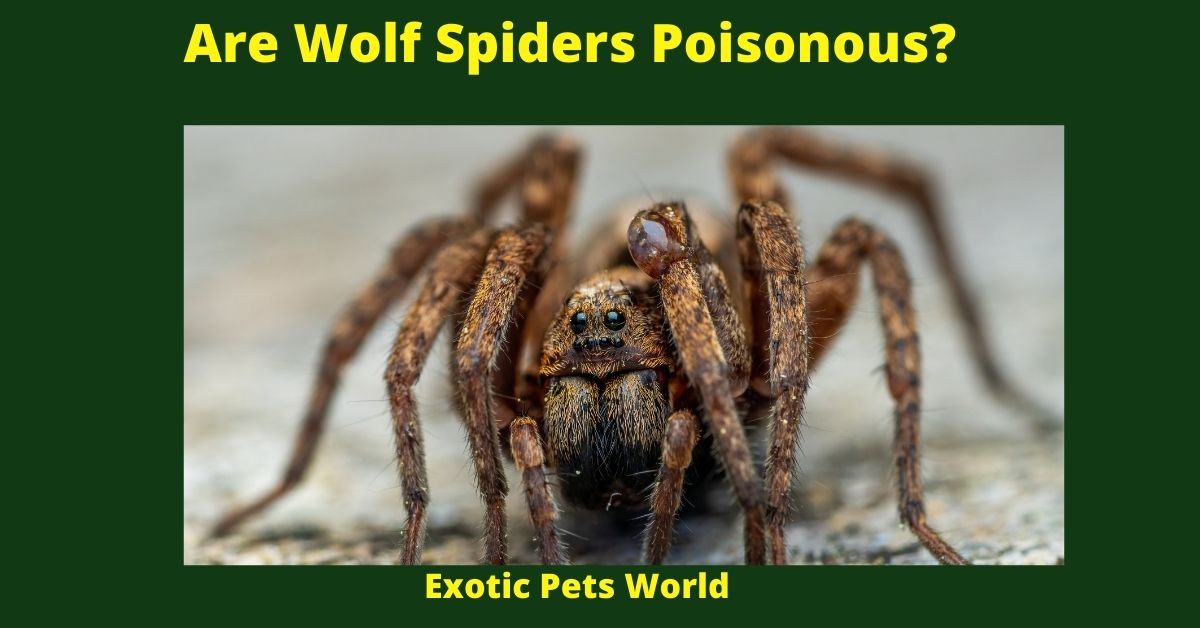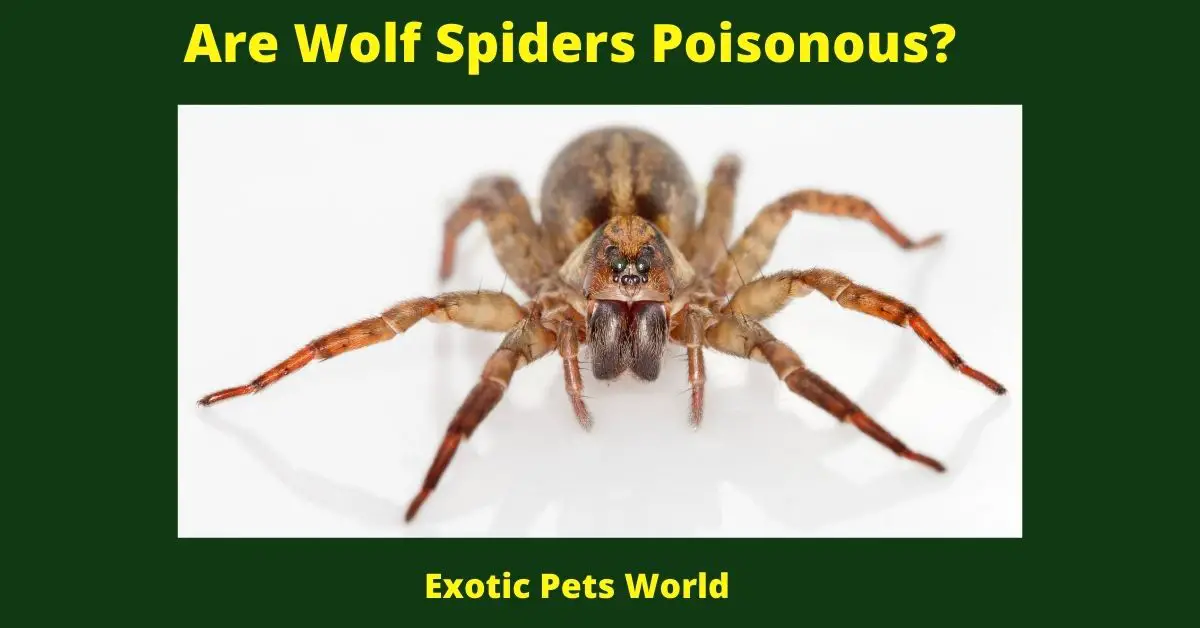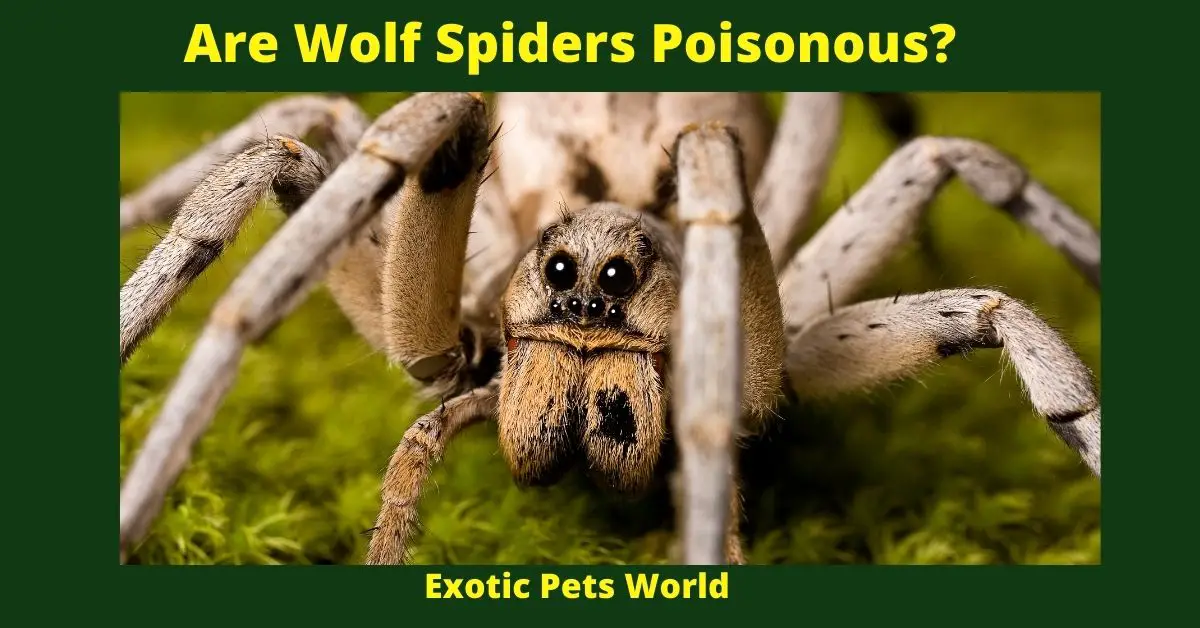Wolf Spiders are Not Poisonous to people. They have venom and fangs but they are so small they usually only cause minor irritation if they try to bite you.
Are Wolf Spiders Poisonous?
Wolf spiders are the most common type of spider found in North America. Are they poisonous? Are wolf spiders venomous? What is a Wolf Spider bite like? Let’s find out!
What do wolf spiders look like and where do they live in the United States?
There are around 2000 different types of wolf spiders in the world, and around 45 of them live in the United States. Wolf spiders are usually brown or black with stripes on their backs. They have long legs and can move very quickly. They live in a variety of habitats, including forests, fields, and gardens.
Wolf spiders do not build webs to catch prey; they hunt and scavenge for food. They are venomous, but their venom is not dangerous to humans. Are Wolf Spiders Poisonous?
Wolf Spiders Are Not Poisonous
Wolf spiders are not poisonous to humans. Their venom is not dangerous to us and they will not bite people unless they feel threatened. However, some people may be afraid of wolf spiders because they look like giant tarantulas. Wolf spiders are much smaller than tarantulas and do not have the hairy legs that tarantulas have.
If you see a wolf spider in your home, don’t worry – they are perfectly harmless! Just leave them alone and they will go away on their own. If you want to get rid of them, you can use a vacuum cleaner or insecticide spray, but make sure it is safe to use around pets and children. Jump to Wolf Spiders: Comprehensive Guide
Are Wolf Spiders Poisonous?
All spiders subdue their prey with venom injected through their fangs. Wolf spiders are no exception, and they can deliver a painful bite if mishandled. However, wolf spider venom is not considered harmful to humans. Some people may experience localized swelling or redness at the site of the bite, but there is no reason for alarm. There have been no reports of serious illness or death caused by wolf spider venom in North America.
They have been known to hunt and kill small lizards and snakes. experience localized swelling or redness at the site of the bite, but there is no reason for alarm. There have been no reports of serious illness or death caused by wolf spider venom in North America. They have been known to hunt and kill small lizards and snakes, and small mice.

How to identify a wolf spider bite and what to do if you’re bitten?
If you are bitten the bite will look like a small, red mark on the skin. It is not always easy to tell if you have been bitten by a wolf spider but most people will know if they have as bites can be quite painful.
If you are bitten, there is no need to panic. Firstly, clean the wound with soap and water and then apply an ice pack to help reduce swelling. You can also take ibuprofen or paracetamol to help relieve any pain.
The best thing to do is keep the wound clean and dry and wait for it to heal naturally. If you experience any symptoms such as nausea, fever, or intense pain, seek medical advice immediately.
What are Wolf Spider Characteristics?
- Wolf spiders are hunters
- Wolf spiders have 8 eyes
- Wolf spiders are pale brown or gray
- The body of a wolf spider is about ¼ to ½ inch long, with the leg span being twice as long. They are typically pale brown or gray in color and have stripes on their legs. Wolf spiders are not poisonous to humans, but their bites can be painful. They are considered beneficial because they eat other pests, such as mosquitoes.
- A wolf spider bite can cause pain, redness, and swelling in humans. They are not poisonous to people but their bites often result in localized skin irritation or inflammation. People who have a severe allergic reaction may experience more serious symptoms such as anaphylaxis which is life-threatening. Meet with your doctor if you believe that you may be having an allergic reaction.
- Get emergency medical help if the person develops hives or difficulty breathing after being bitten by this type of spider; these signs could indicate a dangerous allergy. Cleanse the wound thoroughly because it will likely become irritated when exposed to air once deflated since one function of felt-like pads covering its fangs (raptorial claw tufts) during rest involves protection from
- Wolf spiders live outdoors
- They are nocturnal hunters and eat a variety of insects. They do not spin webs, but they can climb smooth walls and run across ceilings with ease. When it’s time for the spider to shed its skin, it will molt. This is also when baby spiders emerge from their egg sacs as well as males during mating season in early summer after the adults have completed molting where adult males become visible again by shedding their last few skins before attempting matings later that same year or possibly into fall if successful; females may live up to two years beyond maturity while males only live about one more than that .
- It takes nearly three months for wolf spiders to hatch out of eggs laid at least eight weeks earlier which means that there are usually multiple generations of spiders living at any one time.
- Wolf spiders can live up to two years, but most die within the first year. They typically only have one generation per year and lay their eggs in the late summer or early fall.
- They also like to live in barns and woodpiles.
- They are nocturnal so accidentally being bitten at night is more common.
Are Wolf Spiders Helpful?
Wolf spiders are beneficial because they eat other bugs like roaches and can be found in the garden as well as your home. They’re not venomous to humans, but will bite if threatened or caught by hand.
They help keep insects under control around your house which reduces pests that spread diseases or damage crops grown in the garden. You don’t have to worry about them biting you, but they might give you a good scare if you see one running around!
The Dangers of Wolf Spiders.
Wolf spiders also have a bad reputation because they sometimes show up in homes. If you see a wolf spider in your home, don’t touch it! Just leave it alone and it will eventually find its way out. Wolf spiders are beneficial creatures that help keep pests under control, so try to coexist with them if you can. If you’re really scared of them, though, call an exterminator to get rid of them.

How to Get Rid of Wolf Spiders?
- The best way to get rid of wolf spiders is to remove their food source. Wolf spiders eat other insects, so if you can eliminate the other insects in your home or yard, the wolf spiders will go away too. You can also use pesticides to kill the spider’s prey, which will also kill the wolf spiders.
- Another way to get rid of wolf spiders is to physically remove them from your home or yard. This can be done by hand or with a dustpan or vacuum. Do not use pesticides on wolf spiders, as they are often beneficial to have around your home because they eat other insects.
- Wolf Spiders can also be repelled by certain scents and sprays that will keep them out of an area. The best way to repel these creatures is with peppermint oil. You can apply the oil in spray form onto doorways, windowsills, baseboards, flower beds, and any areas where you see wolf spiders entering your house or yard from outside. Other natural oils such as citronella, lavender, eucalyptus, cedarwood, and tea tree oil may work just as well for keeping wolves at bay but it depends on how sensitive you are to the chemical scents.
- Wolf spiders are not poisonous to humans but they can bite if threatened. The wolf spider’s mouth is too small to actually break the skin on a human, so their bites do not hurt at all; however, people may be more prone to getting bit by these creatures because there is some minor irritation involved when bitten by any type of spider. Because of this, it may be best for children and elderly adults who cannot deal with irritations caused by bug bites or allergies. Wolf Spiders tend to stay away from large groups of people, therefore you won’t see them in crowded areas like schools or hospitals very often. If you do feel that your family members are having an allergic reaction after being bitten by a wolf spider
- Clean up any debris that could be used as a place for a wolf spider to make its home. Keep your outdoor spaces tidy and free of trash or clutter, such as woodpiles and leaves that have fallen from trees.
Final Thoughts – Are Wolf Spiders Poisonous?
In Summary: Wolf spiders are a common pest that can be found in your home or yard. They eat other bugs and keep insect populations down, but they may fight with you for space if their population gets too big. The best way to get rid of wolf spiders is by removing the food source from your home or getting them out physically when possible. You can also use peppermint oil as a repellent, which will help prevent any bites from occurring when trying to kill these creatures off completely
